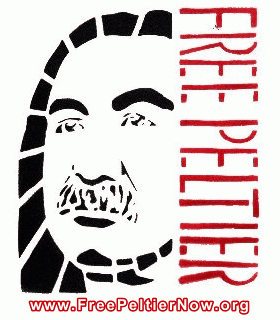
Equal Justice for Leonard Peltier

 Maxine K. signed
just now
Maxine K. signed
just now  Adam B. signed
just now
Adam B. signed
just now 
Attorney General Loretta Lynch
U.S. Department of Justice
950 Pennsylvania Avenue NW
Washington, DC 20530-0001
Dear Attorney General Lynch:
In 1975, the Select Committee to Study Governmental Operations with Respect to Intelligence Activities (also known as the Church Committee) investigated the counterintelligence activities of the Federal Bureau of Investigation (FBI) over a 25-year period. With regard to its COunter INTELligence PROgram, or COINTELPRO, operations, the Church Committee found the Bureau responsible for: violating and ignoring the law; exceeding its powers with regard to domestic intelligence activity; using excessively intrusive techniques against United States citizens; using covert action to disrupt and discredit domestic groups; abusing intelligence information for political purposes; and having inadequate controls, as well as no accountability. As you know, COINTELPRO was centrally directed and targeted a range of political dissidents and organizations. The stated goals of COINTELPRO were to "expose, disrupt, misdirect, discredit, or otherwise neutralize" those persons or organizations that the FBI found objectionable, i.e., a threat to the status quo. The Rev. Martin Luther King, Jr., was one of the most notable of these COINTELPRO targets.
During the 1970s, the American Indian Movement (AIM) also was a target of the FBI. AIM activist Leonard Peltier was wrongfully convicted in 1977 in connection with the shooting deaths of two FBI agents and has served 40 years in federal prison despite proof that he was convicted on the basis of fabricated and suppressed evidence, as well as coerced testimony.
The United States Courts of Appeal have repeatedly acknowledged investigative and prosecutorial misconduct in this case—evident from the time of Peltier's extradition from Canada to his trial and subsequent sentencing:
"Much of the government’s behavior at the Pine Ridge Reservation and in its prosecution of Mr. Peltier is to be condemned. The government withheld evidence. It intimidated witnesses. These facts are not disputed."[1]
"The use of the affidavits of Myrtle Poor Bear in the extradition proceedings was, to say the least, a clear abuse of the investigative process by the FBI."[2]
"[W]e find that the prosecution withheld evidence from the defense favorable to Peltier, and that had this evidence been available to the defendant it would have allowed him to cross-examine certain government witnesses more effectively."[3]
"[T]he FBI used improper tactics in securing Peltier’s extradition from Canada and in otherwise investigating and trying the Peltier case. Although our court decided that these actions were not grounds for reversal, they are, in my view, factors that merit consideration in any petition for leniency filed . . . We as a nation must treat Native Americans more fairly . . . Favorable action by the President in the Leonard Peltier case would be an important step in this regard."[4]
Peltier also has been denied fair consideration for parole by unscrupulous, untruthful, and overzealous prosecutors who know parole authorities do not consult the court record and will therefore take on faith any false statements the prosecutors care to make.
On June 23, 1995, Amnesty International submitted a letter of concern about the Peltier case to then Attorney General Janet Reno. The world renowned human rights organization sought but failed to obtain an Executive Review of the case.
We agree with senior deputy director of Amnesty International-USA Curt Goering who, after the U.S. Parole Commission denied Peltier parole in August 2009, stated: “Given that the case against Peltier unraveled years ago, his continued imprisonment is only protracting a grave miscarriage of justice... When you consider the concerns that plague the case... it is unconscionable that Leonard Peltier should continue to suffer behind bars. It is high time for the U.S. government to... right the wrongs of the past."
We call on you, Ms. Lynch, to conduct an Executive Review of the Peltier case without delay, one that addresses:
•FBI agents' use of improper techniques or coercive tactics, as well as fabricated evidence;
•FBI laboratory personnel's use of poor scientific techniques, mishandling of evidence, provision of skewed or completely false testimony to support prosecution claims, or providing fabricated evidence; and
•prosecutorial misconduct such as courtroom misconduct; mishandling of physical evidence (hiding, destroying, and/or tampering with evidence, case files or court records); failing to disclose exculpatory evidence; threatening, badgering, and/or tampering with witnesses; and using false or misleading evidence.
This review also should include examination of post-conviction actions on the part of FBI officials and agents, as well as prosecutors, to prevent fair consideration of Peltier's applications for parole and Executive Clemency.
It is long past time to rectify an immense and evident injustice. The politically-motivated prosecution of Leonard Peltier is an abuse of power.
Conduct an Executive Review of the Peltier case now. Only through such honorable action, which is wholly in your power, can we be sure that justice will, at last, be done.
[1] Per Curiam Opinion by Circuit Judge Seymour and Senior Circuit Judges Anderson and Brorby, Peltier v. Booker, 348 F.3d 888, 896 (10th Cir. 2003).
[2] Hon. Donald Ross, writing for the Court in United States v. Peltier, 585 F.2d 314, 335 n.18 (8th Cir. 1978).
[3] Hon Gerald Heaney, writing for the Court in United States v. Peltier, 800 F.2d 772, 775 (8th Cir. 1986).
[4] Hon. Gerald Heaney Letter to Sen. Daniel Inouye (Apr. 18, 1991).
Sponsor
Links
Comment
See More 0